|
|
|
Sort Order |
|
|
|
Items / Page
|
|
|
|
|
|
|
| Srl | Item |
| 1 |
ID:
147202
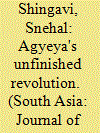

|
|
|
|
|
| Summary/Abstract |
Sachchidananda Hiranand Vatsyayan, also known as ‘Agyeya’, famously penned his three-volume modernist Hindi novel, Shekhar: Ek Jivani (Shekhar: A Life) while he was imprisoned by the British during 1930–33 for his participation in revolutionary terrorist activities. The novel, however, was incompletely published: only the first two volumes were released (in 1941 and 1944, respectively). The incompleteness of Agyeya's Shekhar manifests both writerly dissatisfaction and the transformation of the political landscape in newly independent India. Shekhar, a story of the life of a revolutionary, becomes impossible once revolution is undesired and impossible. The form of the novel, its revolutionary ambition and the construction of a writerly sensibility are all exhausted in the same moment. While revolutionary ambition is normally associated in Hindi with the realism of the All India Progressive Writers Movement (AIPWA), Agyeya's modernism was born out of aesthetic debates that he had with the poets affiliated to the AIPWA and from his Trotskyist politics.
|
|
|
|
|
|
|
|
|
|
|
|
|
|
|
|
| 2 |
ID:
147206
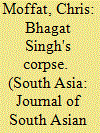

|
|
|
|
|
| Summary/Abstract |
This article explores how a sense of responsibility toward the revolutionary Bhagat Singh (1907–31) is mediated by and articulated through a relationship with the martyr's written remains. It considers how efforts to reconstruct ‘the real’ Bhagat Singh propel a polemic around the ‘proper’ subject of Indian politics, one that destabilises common sense nationalist narratives and extant autobiographies of the Indian Left. These interventions must, however, grapple with the anarchic potentiality of Bhagat Singh's self-sacrifice: empiricist efforts are tempted to engage in spectral practices of conjecture and counterfactual, building a politics of inheritance around a future that never came to pass.
|
|
|
|
|
|
|
|
|
|
|
|
|
|
|
|
| 3 |
ID:
147199
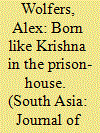

|
|
|
|
|
| Summary/Abstract |
The revolutionary thinker and later yogi of Pondicherry, Aurobindo Ghose (1872–1950), played a critical role during the Swadeshi movement in Bengal, articulating a radical vision that determined the limits and possibilities of the Indian political. Reading his polemical journalism in Bande Mataram alongside his prison memoir, Karakahini, reveals the importance of the jail for his staging of politics. This paper refutes the usual dichotomy of politics and spirituality in readings of Aurobindo and instead explores their underlying interconnectedness in relation to his scripting of an insurrectionary and universalist Hindu metaphysics in which divinity intervened in human history on the side of the oppressed. Aurobindo's central symbol—of Krishna being born in a prison cell—inscribed enduring theo-political significance into the colonial jail, which was successfully re-imagined as a revolutionary ashram, a transformative and sovereign space where political prisoners could be reborn.
|
|
|
|
|
|
|
|
|
|
|
|
|
|
|
|
| 4 |
ID:
147203
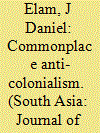

|
|
|
|
|
| Summary/Abstract |
Bhagat Singh (1907–31) is popularly celebrated as one of the major leaders of the Indian anti-colonial movement. Scholars have pointed to his writings to demonstrate his philosophical mastery. One of the primary texts used to support this claim is the activist's jail notebook, a collection of reading notes Bhagat Singh produced while in jail. The existence of the jail notebook, however, has only been used as proof of Bhagat Singh's mastery, rather than as possibly articulating its own philosophy for anti-colonial revolution. This essay analyses Bhagat Singh's jail notebook in order to offer a theory of ‘commonplace anti-colonialism’ and inconsequence. Rather than use the jail notebook to corroborate Bhagat Singh's ‘mastery’ as an anti-colonial revolutionary thinker, this essay argues that the jail notebook reveals a more radical revolutionary politics: of reading. Bhagat Singh's reading practices, especially in the face of death, suggest a new way to theorise ‘revolution’ as the perpetual deferment of authority and mastery, rather than the eventual assumption of those positions. Consequently, ‘inconsequential reading’ may, in turn, reveal a more radically egalitarian politics of revolution than previously ascribed to Bhagat Singh.
|
|
|
|
|
|
|
|
|
|
|
|
|
|
|
|
| 5 |
ID:
147201
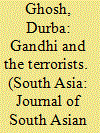

|
|
|
|
|
| Summary/Abstract |
Known for his advocacy of non-violence as a political strategy, this essay examines Gandhi's prolonged debates with revolutionary terrorists about the efficacy of non-violence. Over the course of three decades, Gandhi attempted to bridge the divide between non-violence and violent resistance, and recognised those who espoused political violence as embodying a shared sense of sacrifice and suffering; those who were jailed or detained for their crimes actively debated these strategies with him, even if they did not wholly agree about the efficacy of non-violence. The first two sections focus on Gandhi's engagements with the lives of two revolutionary terrorists who died as a result of their actions, Madanlal Dhingra and Gopinath Saha. The final section examines how two women revolutionary terrorists, Bina Das and Kamala Dasgupta, engaged with Gandhi and eventually joined his non-violent movement.
|
|
|
|
|
|
|
|
|
|
|
|
|
|
|
|
| 6 |
ID:
147200


|
|
|
|
|
| Summary/Abstract |
The first generation of radical nationalists in British India played a crucial role in the emergence of political propaganda as a fully fledged industry in the era after the partition of Bengal in 1905. Bal Gangadhar Tilak's 1897 trial is a key moment in this story: it marks the first time that dissent was criminalised, and that reading publics across British India were confronted with powerful arguments theorising political violence. This paper attempts to draw out the meanings Tilak made in two of his texts (an article and a poem, both published in Kesari) and the two most influential readings to which they were subject at the time: one in the courtroom, where the texts were successfully assimilated to the narrowest possible legal interpretation, resulting in Tilak's conviction, and the other in the Indian press, where the drama of the trial eclipsed the texts themselves. The trial moderated the militant message of the texts for the middle-class print public and allowed for a more acceptable definition of radicalism to emerge, one anchored in themes of suffering, sacrifice and victimisation.
|
|
|
|
|
|
|
|
|
|
|
|
|
|
|
|
| 7 |
ID:
147204


|
|
|
|
|
| Summary/Abstract |
Building on recent analyses of futurity, I argue that the Pakistani poet Faiz Ahmed Faiz's communist affiliation created new routes of movement, new threats of confinement, and at different moments, produced significantly different visions of the future. Part one unearths the ‘grammar of futurity’ in Faiz's prison verses (1951–54), which I compare with those of the Chilean poet, Pablo Neruda. Part two examines Faiz's travelogue of his 1973 visit to Cuba, which reveals his aspirations for Pakistan's future. Faiz's enduring political and cultural utility, I conclude, is bound up with the ambiguous nature of futurity offered in his writing.
|
|
|
|
|
|
|
|
|
|
|
|
|
|
|
|
| 8 |
ID:
147207
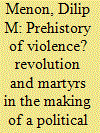

|
|
|
|
|
| Summary/Abstract |
The Communist Party of India (CPI) adopted a revolutionary line in 1948, but agrarian insurrection was efficiently suppressed by the newly independent Indian state. The CPI moved towards an engagement with parliamentary communism, and in 1957, Kerala became the first state in the world to elect a communist government to power. However, the idea of transformative, revolutionary violence stayed alive and became the premise for brutal internecine warfare between the Left and its opponents in the northern part of Kerala. This paper argues, pace Benjamin, that this violence must be seen as instituting another law than that of the state, positing the ideal of justice over the mere rhythms of parliamentary representation.
|
|
|
|
|
|
|
|
|
|
|
|
|
|
|
|
| 9 |
ID:
147208
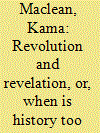

|
|
|
|
|
| Summary/Abstract |
If historiography is ordered by a series of thematic and methodological turns, then it is not hard to demonstrate that there has in recent years been a turn towards revolutionary histories of South Asia. Scholars have begun to transcend the limitations of Gandhian frameworks in search of more dynamic understandings of Indian pasts that factor in the role of violence, subterfuge and conspiracy in South Asian anti-colonial struggles. But what happens when new methodologies and narratives begin to destabilise or even invert longstanding historical readings that have been the basis for generations of academic knowledge of the past? When, and under what political and institutional conditions, are fresh interpretations of history sayable? Can historical trajectories or interpretations be quickly turned or must they evolve slowly? This paper is a self-reflexive critique of the ways in which radical histories can—or cannot—be written in the post-colonial moment, with reference to the compulsions brought to bear in the writing of revolutionary history. This article considers these historiographical issues alongside compelling evidence of the involvement of Jawaharlal and Motilal Nehru in key aspects of the revolutionary actions of the Hindustan Socialist Republican Association.
|
|
|
|
|
|
|
|
|
|
|
|
|
|
|
|
| 10 |
ID:
147205
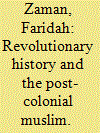

|
|
|
|
|
| Summary/Abstract |
This paper takes the ‘Silk Letters Conspiracy’, a complex, transnational scheme uncovered by British colonial officials in 1916, as the starting point for a discussion on the writing of revolutionary histories in post-colonial India. It considers the generally vexed position of Muslims in histories of early twentieth-century anti-colonialism and the lengths to which some scholars, particularly those associated with the Deoband seminary in northern India, have gone in response in order to create a counter-narrative of Muslim revolutionary anti-colonialism that was fully in keeping with the broader nationalist struggle. Later, the paper speculates on whether other historical lives, such as that of Abul Kalam Azad, one of the most high-profile Muslims in the leadership of the Indian National Congress in the 1940s and 1950s, could also be so re-inscribed and made part of the revolutionary script of the 1910s, and to what end this might be done. Throughout, this article meditates on the problematic nature of testimony, memory and the colonial archive.
|
|
|
|
|
|
|
|
|
|
|
|
|
|
|
|
|
|
|
|
|